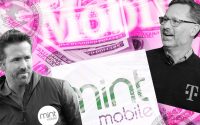Could a robot win a Grammy? AI music is eligible — sort of
Hold the (gramo)phone: Artificial intelligence-generated music is eligible for Grammy Awards — err, kind of.
The Recording Academy announced sweeping changes Friday to music’s biggest night, including that it will allow entries that use AI, as long as there is a “meaningful” and “relevant” human component.
“The GRAMMY Award recognizes creative excellence,” reads the guidelines for the 66th annual Grammy Awards, set for Feb. 4, 2024. “Only human creators are eligible to be submitted for consideration for, nominated for, or win a GRAMMY Award.”
The regulations strictly state that AI work without “human authorship” is barred from the competition. However, “elements of AI material” are acceptable.
The updated regulations coincide with a rise in AI-generated music and deepfake tracks.


Two-time Grammy winner David Guetta shocked fans this year with an Eminem track, except the Real Slim Shady never actually recorded it.
Then, a fake Drake and The Weeknd song, “Heart on My Sleeve,” went viral, prompting demands for removal from Universal Music Group due to copyright infringement.
At the time, a UMG rep told The Post that the tune, which samples the artists’ voices, “begs the question as to which side of history all stakeholders in the music ecosystem want to be on: the side of artists, fans and human creative expression, or on the side of deep fakes, fraud and denying artists their due compensation.”
The music group reportedly asked streaming giants like Spotify and Apple Music to “block” AI software companies from using the label’s songs to train their tech due to the rise in deepfake vocals.


This week, Sir Paul McCartney revealed his plans for a “final Beatles record” with a little help from his friends: AI and “Lord of the Rings” director Peter Jackson.
“He [Jackson] was able to extricate John’s voice from a ropey little bit of cassette that had John’s voice and a piano,” McCartney told BBC about the late John Lennon. “He could separate them with AI — he could tell the machine, ‘That’s the voice, that’s the guitar, lose the guitar.’ And he did that, so it has great uses.”
He added: “We were able to take John’s voice and get it pure through this AI, so then we could mix the record as you would normally do.”
And, while “American Pie” songwriter Don McLean believes computer-generated melodies won’t be “worse” than some of today’s hits, a member of Daft Punk begs to disagree.

“We tried to use these machines to express something extremely moving that a machine cannot feel, but a human can,” Thomas Bangalter, one of the robotic mugs of Daft Punk, recently told BBC.
“We were always on the side of humanity and not on the side of technology,” he added of the electronic duo, which split two years ago.


